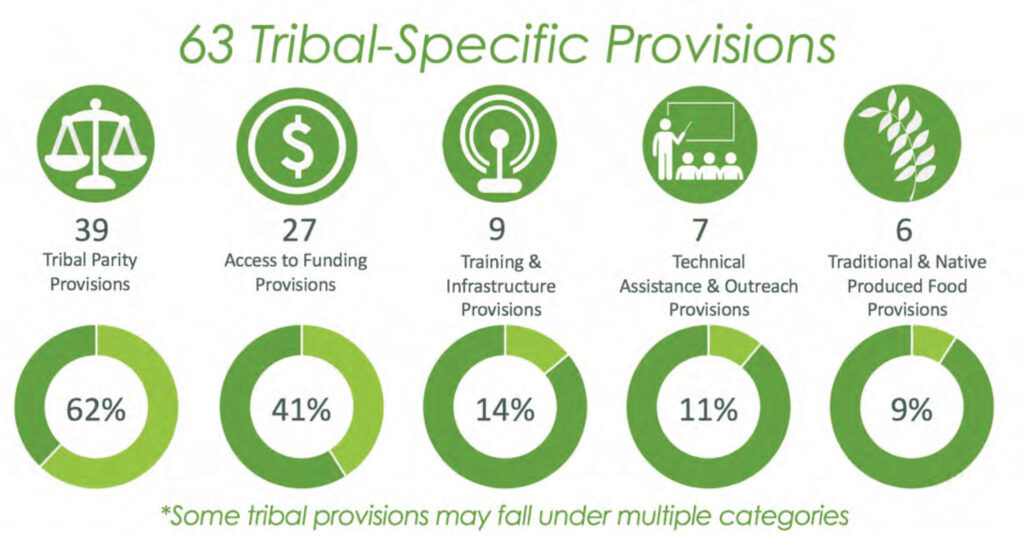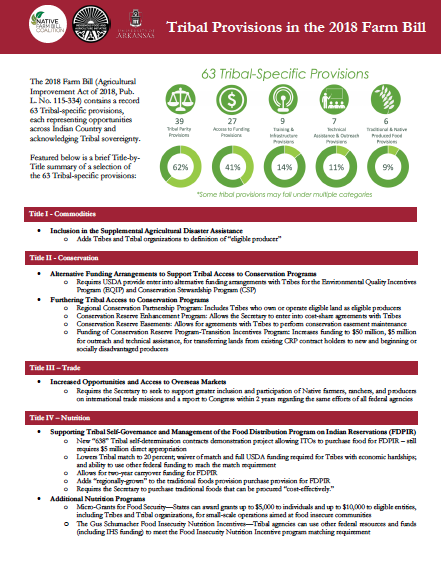
The 2018 Farm Bill (Agricultural Improvement Act of 2018, Pub. L. No. 115-334) contains a record 63 Tribal-specific provisions, each representing opportunities across Indian Country and acknowledging Tribal sovereignty. Featured below is a brief Title-by- Title summary of a selection of the 63 Tribal-specific provisions:
Title I – Commodities
- Inclusion in the Supplemental Agricultural Disaster Assistance
- Adds Tribes and Tribal organizations to definition of “eligible producer”
Title II – Conservation
- Alternative Funding Arrangements to Support Tribal Access to Conservation Programs
- Requires USDA provide enter into alternative funding arrangements with Tribes for the Environmental Quality Incentives Program (EQIP) and Conservation Stewardship Program (CSP)
- Furthering Tribal Access to Conservation Programs
- Regional Conservation Partnership Program: Includes Tribes who own or operate eligible land as eligible producers
- Conservation Reserve Enhancement Program: Allows the Secretary to enter into cost-share agreements with Tribes
- Conservation Reserve Easements: Allows for agreements with Tribes to perform conservation easement maintenance
- Funding of Conservation Reserve Program-Transition Incentives Program: Increases funding to $50 million, $5 million for outreach and technical assistance, for transferring lands from existing CRP contract holders to new and beginning or socially disadvantaged producers
Title III – Trade
- Increased Opportunities and Access to Overseas Markets
- Requires the Secretary to seek to support greater inclusion and participation of Native farmers, ranchers, and producers on international trade missions and a report to Congress within 2 years regarding the same efforts of all federal agencies
Title IV – Nutrition
- Supporting Tribal Self-Governance and Management of the Food Distribution Program on Indian Reservations (FDPIR)
- New “638” Tribal self-determination contracts demonstration project allowing ITOs to purchase food for FDPIR – still requires $5 million direct appropriation
- Lowers Tribal match to 20 percent; waiver of match and full USDA funding required for Tribes with economic hardships; and ability to use other federal funding to reach the match requirement
- Allows for two-year carryover funding for FDPIR
- Adds “regionally-grown” to the traditional foods provision purchase provision for FDPIR
- Requires the Secretary to purchase traditional foods that can be procured “cost-effectively.”
- Additional Nutrition Programs
- Micro-Grants for Food Security—States can award grants up to $5,000 to individuals and up to $10,000 to eligible entities, including Tribes and Tribal organizations, for small-scale operations aimed at food insecure communities
- The Gus Schumacher Food Insecurity Nutrition Incentives—Tribal agencies can use other federal resources and funds (including IHS funding) to meet the Food Insecurity Nutrition Incentive program matching requirement
Title V – Credit
- Improving Access to Credit for Tribal Producers
- Requires a GAO study on access to the Farm Credit System in Indian Country
Title VI – Rural Development
- Building Infrastructure and Economic Development Opportunities
- Creates a permanent Tribal technical service and assistance office across all USDA Rural Development funding authorities
- Provides refinancing authority for loans currently within the Substantially Underserved Trust Areas (SUTA) designation
- Tribal priority, inclusion, and access to two broadband programs to build infrastructure and economic development opportunities in Indian Country; increases broadband funding to $325 million (from $25 mil.)
Title VII – Research
- Inclusion and Parity for Tribal Colleges and Universities (TCUs)
- Adds 1994 TCUs as eligible for the McIntire-Stennis Forestry program capacity funding
- Reauthorization of support for TCUs, updating 1994 Tribal Colleges list
- Creates a Native American student scholarship fund for Tribal students who attend land grant universities and colleges
- TCU eligibility: Children, Youth and Families at Risk (CYFAR), Federally Recognized Tribes Extension Program (FRTEP)
Title VII – Forestry
- Self-Governance and Parity for Healthy Forestry Management
- Establishes a 638 Tribal Self-Governance Demonstration Project for management of Forest Service and Bureau of Land Management lands adjacent to Indian lands under the Tribal Forest Protection Act
- Tribal governments eligible for Good Neighbor Authority to enter forestry management agreements with states and USDA
Title X – Horticulture
- Legalization of Industrial Hemp
- Legalizes hemp production under USDA approved Tribal and State plans to self-regulate, develop, and expand hemp production; provides plan development technical assistance to Tribes; and requires States permit a Tribe to transport hemp produced under an approved plan.
Title XI – Crop Insurance
- Underserved Producers
- Includes Tribal producers in USDA’s review and report of whether crop insurance is providing adequate coverage
Title XII – Miscellaneous
- Upholding the Trust Responsibility
- Maintains the Office of Tribal Relations within the Office of the Secretary to report directly to the Secretary of Agriculture
- Additional Tribal government and producer eligibility and permanent baseline funding for the newly combined Farming Opportunities Training and Outreach (FOTO) program for beginning and socially disadvantaged farmers and ranchers
- Codifies the existence and access to federal agency resources and technical assistance for Tribal Promise Zones.
- Tribal Advisory Committee
- Establishes a new 11-member Tribal Advisory Committee through the Office of Tribal Relations to provide advice to the Secretary on Tribal-related issues and policies
This passage of 2018 Farm Bill presents an exciting time for Indian Country, yet many provisions must be implemented by USDA. The Native Farm Bill Coalition and its partners remain engaged and active to provide Tribal leaders, Tribal Organizations, and Tribal producers informed during the implementation process as USDA begins holding Tribal consultation, listening sessions, and promulgates proposed regulations.
This document is strictly for educational purposes only and does not constitute legal advice nor create an attorney/client relationship.

